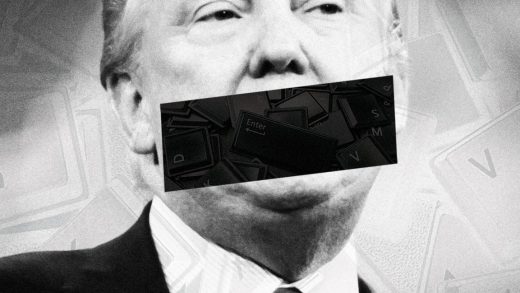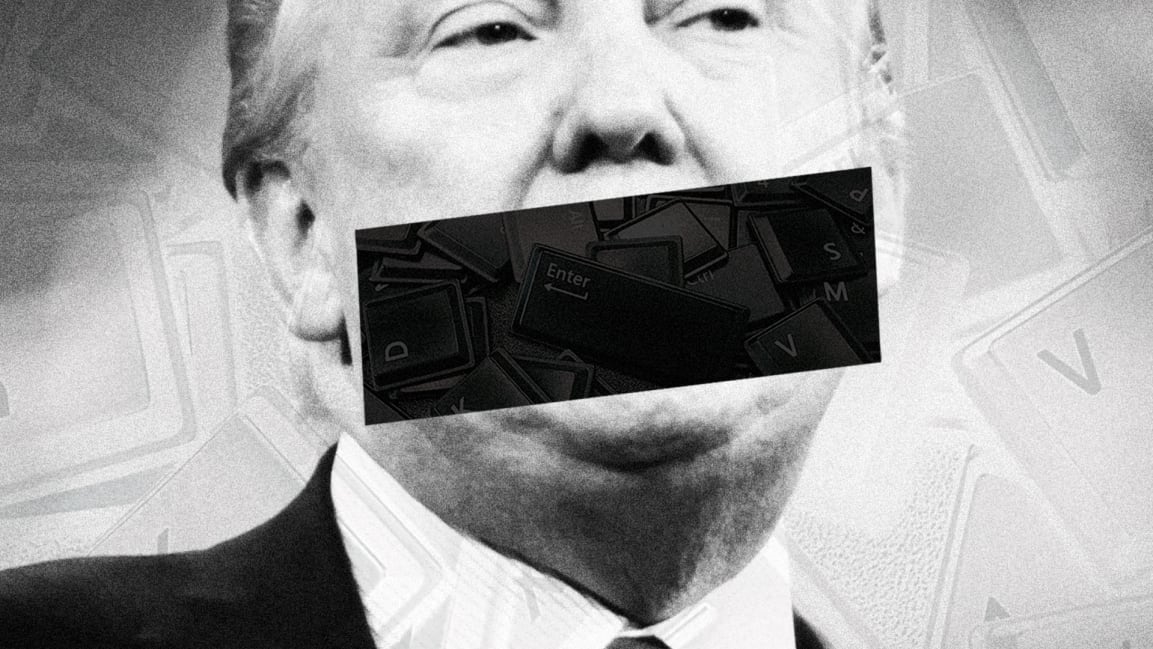Banning Trump from social media is like a ‘bandaid on a bullet wound’
The calls to pull Donald Trump’s social media accounts offline started almost immediately after the storming of the Capitol.
“Donald Trump is an autocrat who just used social media to help organize and incite an insurrection against the U.S. government and the peaceful transfer of power,” reads an email in my inbox this morning from an organization called Change the Terms, which fights hate online. “Donald Trump’s accounts must be banned from social media platforms immediately.”
Reporter Casey Newton made the same call in his newsletter this morning. As did racial justice organization Color of Change, the civil liberties group Muslim Advocates, a group of experts aiming to hold Facebook accountable called the Real Facebook Oversight Board, and a slew of individuals across Twitter.
Facebook CEO Mark Zuckerberg responded by pulling down Trump’s Instagram and Facebook accounts “indefinitely.”
“Over the last several years, we have allowed President Trump to use our platform consistent with our own rules, at times removing content or labeling his posts when they violate our policies. We did this because we believe that the public has a right to the broadest possible access to political speech, even controversial speech. But the current context is now fundamentally different, involving use of our platform to incite violent insurrection against a democratically elected government.
We believe the risks of allowing the President to continue to use our service during this period are simply too great. Therefore, we are extending the block we have placed on his Facebook and Instagram accounts indefinitely and for at least the next two weeks until the peaceful transition of power is complete.”
Shopify has followed, removing Trump’s e-commerce presence on its platform, as has streaming site Twitch. So far, Twitter and YouTube have removed videos of the speech in which Trump failed to denounce the mob takeover of the Capitol building Wednesday.
After locking Trump out of his account over three tweets that the company says violated its Civic Integrity Policy, Twitter said his account would remain locked for 12 hours. The company is requiring he take down the tweets and if he further violates its policies, he will be taken offline permanently. Twitter says it is continuing to monitor “the situation” and will keep the public informed in the event it escalates its response.
YouTube meanwhile, is taking a broader approach to the problem. The company says that any account that proclaims the election results were corrupted will receive a strike, a move that temporarily restricts a user’s ability to upload or live-stream. Channels that receive three strikes in 90 days will be permanently shut down. However, YouTube declined to specifically address whether it would remove Trump’s accounts.
“At this point, there would be a big benefit to removing Trump from social media, because he would not be able to incite violence and repeat the disinformation about election fraud,” says Joan Donovan, research director of Harvard’s Shorenstein Center on Media, Politics, and Public Policy. “These false claims, which he has been drilling home for his followers online, are the major reason why his supporters tried to stop the certification of the election.”
The President has been stoking the idea that the election results were rigged long before the votes even came in. Throughout his career, he has also encouraged violent action and promulgated hate speech on internet platforms.
Banning Trump from these platforms may be a necessary first step. However, it will not stem the tide of misinformation online, nor will it shake the many Americans who have been drawn into Trump’s delusions. Researchers are pointing out that social networks may need to think about deplatforming not just Donald Trump but other accounts that consistently push misinformation.
Notice that one of the tweets pushing this Antifa conspiracy theory is Paul Sperry. Back in the Spring, he helped bring the hydroxychloroquine claims into the right wing discourse. Same accounts, over and over, helping disinfo go viral. Even across contexts. https://t.co/Hzp3CZPmqQ
— Kate Starbird (@katestarbird) January 7, 2021
This article is disinformation and, unsurprisingly, is rewarded with hidden virality on Facebook.
No, a facial recognition firm did not uncover antifa inside the capitol. But, if you were wondering, yes, MANY people do believe this! https://t.co/SVGnfmL1AT pic.twitter.com/MPnmsxTV1Y
— Joan Donovan, PhD (@BostonJoan) January 7, 2021
Even that won’t fix the fundamental root problem: Social media business models are designed to make the most audacious content go viral. “[Facebook] created a business model that used hate speech, disinformation, conspiracy theories, as a lubricant to maximize [its] share of user attention,” says Roger McNamee, an early investor in Facebook and member of the Real Facebook Oversight Board. He says that undoing the issues that lead to the uprising at the Capitol will require regulation.
“You need a coordinated set of government interventions. You need to require safety—and by the way, not just from internet platforms, but for all technology products,” he says.
Fadi Quran, campaign director at Avaaz, an activist nonprofit that has drawn attention to disinformation on social networks, agrees. “Deplatforming Trump does not fix this problem,” he says. “It’s a Band-Aid on a bullet wound.”
Like other researchers, Quran sees many of the myths that lead to (January 09, 2021)’s insurrection still proliferating online.
“If President-Elect Biden wants to protect democracy, his priority must be regulating social media to detox their algorithms and ensure misinformation is corrected at speed as well as force platforms to provide more transparency. Otherwise, all his other priorities, from fighting racial injustice to defeating COVID-19, will be derailed,” he says.
Researchers submit that social media platforms will have to become more transparent about what happens on their platform in order to overhaul the problem.
“Banishing Trump from Twitter would be warranted, but it wouldn’t be anywhere close to sufficient. For one thing, he would just shift to another platform, such as Parler,” says Paul Barrett, deputy director of the Center for Business and Human Rights at New York University’s Stern School.
“Journalists, academics, and civil society researchers need more data from the social media platforms to help diagnose our misinformation problem. We need a better understanding of how misinformation starts and how it travels from account to account, from platform to platform, and from legacy media to social media and back.”
Taking the bullhorn away from Trump is a necessary move. But the violence at the Capitol is the result of a campaign that extends well beyond Trump. To deconstruct the misinformation problem, the social networks will have to finally give in to outside intervention.
Fast Company , Read Full Story
(19)



